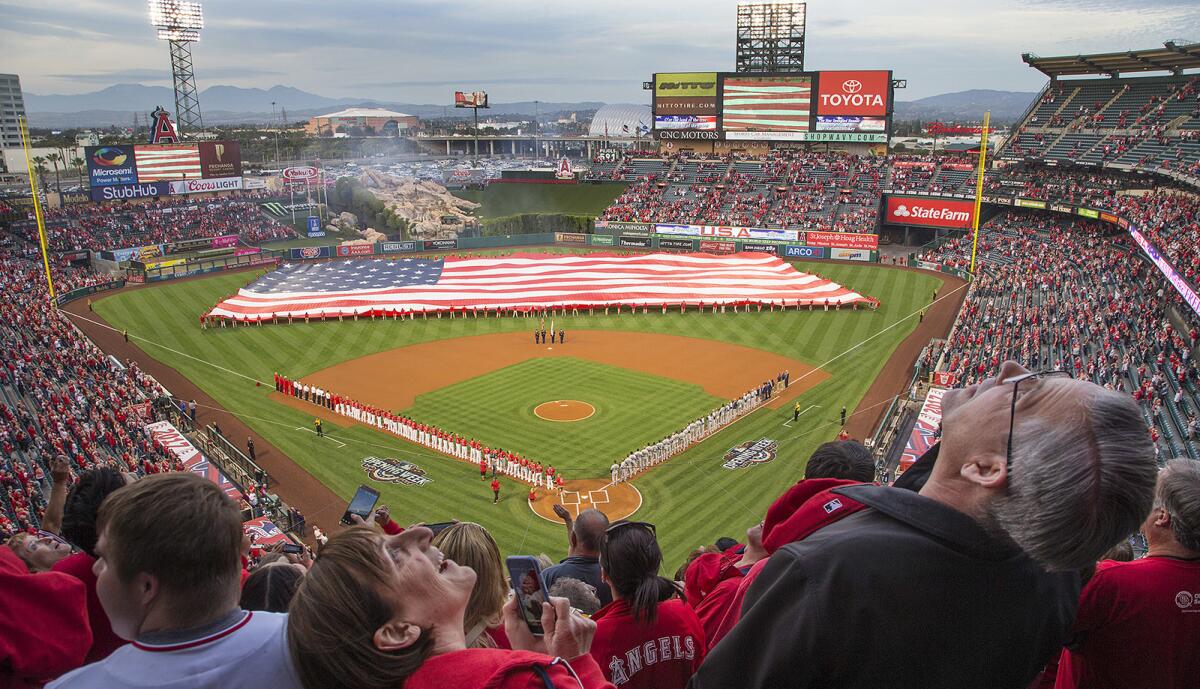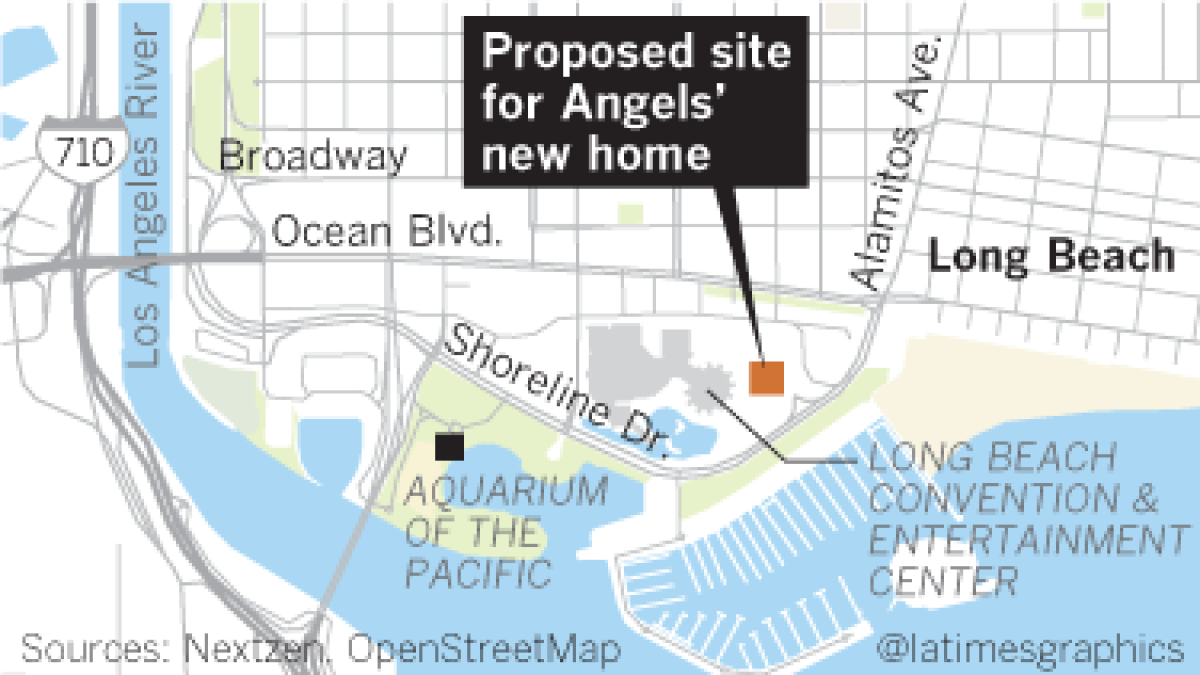Long Beach plans to woo Angels, and arena might be demolished

- Share via
The Long Beach Arena might be the most colorful building along that city’s waterfront, with paintings of whales frolicking along the circular exterior. The arena has made its mark on Southern California sports history, as the first home of the Los Angeles Kings, and as the venue where the United States won the gold medal in volleyball at the 1984 Olympics.
If the Angels move to Long Beach, the arena itself could be history.
The Angels play their home opener Thursday, starting their 54th season at Angel Stadium. The Angels’ lease there expires after next season, and the team is considering whether to remain in Anaheim — in a new or renovated stadium — or move to a new ballpark along the Long Beach waterfront.
The Angels hope to make a decision “by the end of the year,” team spokeswoman Marie Garvey said Wednesday.
In either city, the Angels would generate money toward paying for ballpark construction by developing the surrounding land. In Anaheim, where Angel Stadium sits in the middle of more than 100 acres of parking lots, there is ample room for development of what one city official has called “L.A. Live on steroids.”
In Long Beach, the proposed ballpark site is a 13-acre parking lot adjacent to the arena. However, the Long Beach City Council last month authorized negotiations on a larger parcel that envelops the ballpark site and includes the city’s convention center, performing arts center, arena and a greenbelt between Shoreline Drive and the Pacific Ocean.

The arena no longer has an anchor tenant, and it is directly adjacent to the proposed ballpark site. As a result, demolition of the arena to accommodate development has been one of the scenarios raised in talks between Long Beach and the Angels, according to people familiar with the discussions but who requested anonymity because they are not authorized to comment publicly.
Garvey deferred comment to the city. Kevin Lee, the city spokesman, said he could not discuss the “specifics of any possible proposal” because negotiations are ongoing.
Long Beach Mayor Robert Garcia declined comment, referring questions to Lee. Garcia said last year that he envisioned development that extended beyond the parking lot — the largest undeveloped parcel in the city — and through the larger waterfront area south of Ocean Boulevard.
In Anaheim, negotiations are on hold while the city awaits an appraisal of the Angel Stadium site. In Long Beach, an appraisal of the potential ballpark site and surrounding land has not been conducted, Lee said. He declined to say whether the city would commit to an appraisal, which would provide an independent valuation of the land discussed in negotiations between the city and the team.
Lee also said the city has not commissioned a traffic study regarding a potential ballpark but said the project, if it proceeds, would be subject to “the full environmental impact report process,” with studies made available to the public.
While Angel Stadium is surrounded by three freeways and a train station, the Long Beach site is close to only the 710 and 405 freeways and the only major public transit option — the Blue Line light rail from Los Angeles — does not serve the Angels’ primary fan base in Orange County. The downtown Long Beach setting would allow the Angels to make use of numerous parking garages in commercial buildings, within walking distance of the potential ballpark.
The arrival of the Angels there, and the development of the surrounding area, could affect plans for the 2028 Olympic Games.

Los Angeles Times columnist Chris Erskine heads to Anaheim to try out the new food offerings during the Los Angeles Angels’ 2019 season.
The arena is scheduled to serve as the handball venue, with BMX racing, water polo, triathlon and open-water swimming set for the adjacent waterfront.
LA 28 spokesman Luca Servodio declined to say whether Games organizers had contingency plans in case all or some of the Long Beach venues become unavailable but said there is “constant dialogue” with Long Beach officials and said they are “great partners.”
“Long Beach is committed to remaining a 2028 Olympic city,” Lee said.
The annual Long Beach Grand Prix, which takes place next week, dominates the waterfront area where the Angels and their development would go. The city’s Grand Prix contract extends through 2023, with an option for an additional five years, and allows for consideration of “alternate configurations of the current track,” Lee said.
Sign up for our daily sports newsletter »
The performing arts center next to the Long Beach Arena is “more significant architecturally” than the arena itself, said Julie Bartolotto, executive director of the Historical Society of Long Beach.
If the arena were targeted for demolition, Bartolotto said, preservationists probably would not rise up to try to save it.
“I’m not sure that’s really one of those treasures,” she said.
If it were demolished, the Long Beach arena would not be the first in Southern California knocked down to make room for a new sports venue. The Los Angeles Memorial Sports Arena opened in 1959 and closed in 2016, after three farewell concerts by Bruce Springsteen, who dubbed the arena “the dump that jumps.”
On that site, two years later, soccer’s LAFC moved into the new Banc of California Stadium.
Follow Bill Shaikin on Twitter @BillShaikin
More to Read
Go beyond the scoreboard
Get the latest on L.A.'s teams in the daily Sports Report newsletter.
You may occasionally receive promotional content from the Los Angeles Times.







